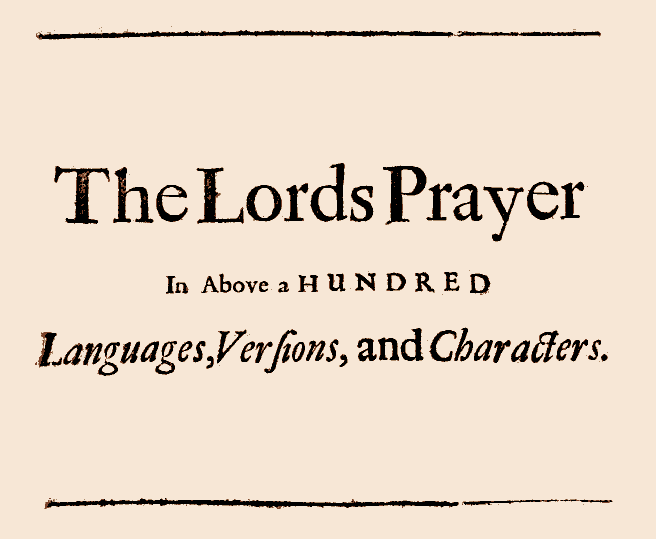
Oratio Dominica
The Lord's Prayer, in many languages
These are pages scanned from a 1713 copy of the book.
More details appearing here as I find the time.
If there is any page you would like scanned that I have not,
or if you would like a higher resolution scan of any page,
let me know.
There was also a fascinating insert in the back of this
book, comparing various forms of the alphabet;
there are images here.
I am interested in making transcriptions of these pages,
either in Latin 1 or in Unicode; if you can help with
any of that, contact me.
If the PNG images don't work for you, there are also
JPEG ones.
I also have a copy of Fry's Pantographia of 1799, which
has 320 pages, but it's too long for me to scan now. If you
are interested, I could scan the pages pertaining to any
given language.
A book-seller's catalogue gave the following description for another copy of the same edition; my copy doesn't have the same hand-written note, of course.
Oratio Dominica. Polygamattos Polymorphos (Greek Letter). Nimirum,
Plus Centum Linguis, Versionibus, Aut Characteribus Reddita &
Expressa. Editio Novissima, Speciminibus Variis Quam Priores
Comitatior.
Small 4to. (6) + 71 (ie 72)pp. Allegorical engraved title-page
vignette. 3 plates in text (for 'Brachmanica', 'Sinica' & 'Gjorganica'
versions). The Lord's Prayer printed in more than one hundred
languages, often with accompanying phonetic reading version.
A ms. note on front endpaper presumably written by William R. Williams
(New York 1868) whose inscription appears at top corner of
title-page, states that the 'present is an enlarged edition of
the First Edition' which 'had become rare & high priced'. In 1715
an Amsterdam reprint of this edition gave the editor's name as
'John Chamberlayne' (d. 1724). Another note in the same hand
suggests the editor was an Irish Catholic mercenary employed by
the Duke of Savoy in the Waldensian massacres (p52-the 'Waldensis'
version is in fact Irish). On pp64 and 65 are two forms from the
projected 'Universal, Philosophical Language' of Dr Wilkins. The
work is essentially a display of fine printing types; some 90
translations of the word 'Father' are given at end. Early calligraphic
ownership signature of 'Thomas Blyth
